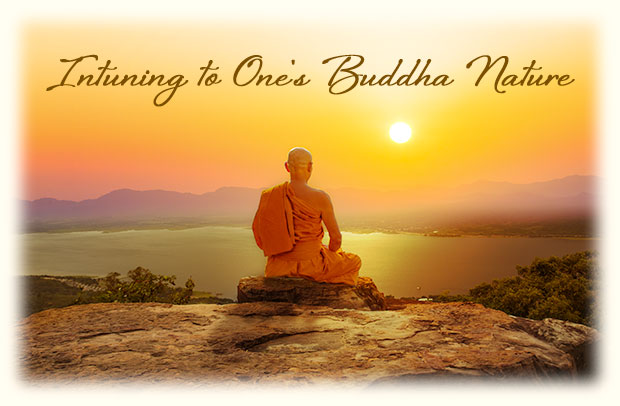

GOD in Buddhism:
The Infinite Buddha Nature
& Our Higher Self
Did the Buddha teach about GOD? Or the concept of an eternal soul? Or a higher spiritual self? This can be a bit of a controversial topic within some schools of Buddhism and some Buddhists will say: "No". But, as we will see, the situation is actually far more complex, subtle and nuanced than that.
Religious Beliefs in North India
at the Time of the Buddha
During the life of the Buddha, there were many different conflicting ideas, descriptions and definitions of GOD floating around the various religious circles of North India. And some of these ideas were rather bizarre to say the least. Plus, various sects believed in an almost endless variety of Hindu God's and Goddesses. Some of these were very God-like, noble and virtuous such as Brahma-Saraswati; Vishnu-Lakshmi; and Shiva-Shakti; but some of the others were believed to occasionally behave in ways that were no better than typical humans - being selfish, jealous, combative, and so on. Consequently, most of the people of North India were very, very confused as to just what they should believe. So, in order to avoid confusing the people even further on these topics, the compassionate Buddha generally avoided talking directly about the concept of GOD in the ways that the people of North India would ordinarily do so.
Sathya Sai Baba says
that Buddha Experienced GOD's Reality
Interestingly, Sathya Sai Baba alludes to the Buddha's skillful discretion on this topic when Sai Baba said:
"Once, some aspirants approached Buddha and asked him whether he had any awareness of God. Buddha remained silent at that time. Later, he called one of his disciples and told him, "Son, there is no meaning in debating and arguing over the unknown. Don't go into such questions. Divinity is not perceptible. It is beyond human comprehension, not within the reach of the mind or speech. First of all, follow the truth and act according to Dharma. Lead a life of non-violence. This is true spiritual sadhana."
- Sathya Sai Baba, "Thought for the Day", May 26, 2007
So, according to Sathya Sai Baba, the Buddha was fully aware of GOD's reality, but generally chose not to teach about it in a direct way. So how did the Buddha extricate the people from their confusion, and still teach about these highest of all sacred concepts in a way that would be truly helpful and appropriate for their time and culture? Well, it depends on which of the two great branches of Buddhism that you examine - the Theravada Path or the Mahayana Path. But, before we look at each path individually, let's first look at what both branches have in common on this topic.
Beliefs Common to Both
the Theravada & Mahayana Paths:
In addition to the Four Noble Truths and the Noble Eightfold Path, virtually all Theravada and Mahayana Buddhists believe in Reincarnation; the Law of Karma; Eternal Life; and the idea that everyone will some day become a Buddha. So, we already have the concept of Eternal Life in both the Theravada and the Mahayana Paths - even without bringing in the concept of a "GOD", "Soul", or "Higher Self".
The Theravada Approach
Now let's focus on the Theravada Buddhists. Most of them believe that the Buddha restricted his teachings on the soul or Higher Self to the idea of an eternal "Luminous Mind" that is present in each one of us, regardless of how we may have gradually and unintentionally covered it over and hidden it with various selfish desires and attachments throughout our many lives. And they believe that by following the Noble Eightfold Path each one of us can gradually free ourselves from these various selfish desires and illusions; and gradually awaken into this enlightened Luminous Mind and thereby eventually attain Nirvana. And, if we're really sincere and super dedicated, it is possible to achieve nirvana during this present lifetime. But, if we can't quite do that, but we're still very dedicated and make good progress, then we can be reborn into a heavenly realm, where we will then be able to reach nirvana. Either way, we never have to be reborn on the earth again and can now live in blissful eternal realms as fully free beings. If we don't qualify for either of these two options, then we will simply keep reincarnating at the physical level on earth until we eventually reach the level of spiritual progress and awakening that will permit us to attain Nirvana or move into the Higher Realms in a future lifetime. (The Buddha's teachings on the "Luminous Mind" can be found in the Anguttara Nikaya of the Pali Canon. One canonical instance is at: A I, 8-10).
And what about "GOD"? Theravada Buddhist believe that since the Buddha taught that the cosmos is eternal, and has always existed, there was no need to talk about a "Creator God", such as the Hindu deity, "Brahma". (It is helpful to remember that at the time of the Buddha some of the Hindu creation myths were pretty bizarre, so it is no wonder that the Buddha encouraged his followers to ignore them.) And that is a pretty much where the subject of GOD stops in the Theravada tradition.
So, if you ask Theravada Buddhists if they believe in GOD, most of them would probably say, "No".
%2c-bangkok%2c-thailand-opt.jpg?crc=377362099)
The Mahayana Approach
It isn't until we enter the world of Mahayana Buddhism that we open up into the much vaster concept of a universal, all-pervading, infinitely wise, infinitely loving, eternal Presence that pervades the cosmos. Plus, in some lineages of the Mahayana Path, we have the idea of an eternal "soul" or Higher Self, as well as the existence of wonderful Celestial Divine Beings - Celestial Bodhisattvas and Celestial Buddhas - all of whom we can pray to for guidance and assistance.
First, we'll focus on the ideas of a Universal Divine Presence and the existence of an eternal "soul" or Higher Self. And since beliefs on these two topics can vary to some degree within various Mahayana lineages, we're going to focus on the classic Mahayana teachings that come from the "Tathagatagarbha Class of Sutras". (Please note: a "sutra" or "sutta" is a Buddhist religious text).
The Buddha Nature & the Tathagatagarbha
According to the lengthy Mahayana Mahaparinirvana Sutra, (usually referred to as the "Nirvana Sutra") on the night before the Buddha died, he gave forth the "supreme teaching of all Buddhist teachings". The following is a brief summary of those teachings:
The Buddha taught that there exists an eternal, universal, all pervasive, all knowing, infinitely wise, infinitely loving presence that is perfect in every way and which is the true underlying reality behind all things. It is found within us, and above us, as well as everywhere else in the cosmos. The Buddha called this all loving universal presence the Infinite "Buddha Nature".
The Buddha taught that each of us has a "Luminous Mind" within us which is "one" with the Universal Buddha Nature. And the process of acquiring "Enlightenment" or "Nirvana" is the gradual process of "uncovering" and "awakening" into this inherent inner Luminous Mind or "Heart Nature" as we let go of selfish desires and attachments; learn our karmic lessons; purify our intentions; and become ever more serene, and "mindful" as we follow the Noble Eightfold Path.
 The Buddha taught that every human being has a Higher Self that already exists in its complete, eternal, "brightly shining", perfected form within the inner reality of each individual. The Buddha called this brightly shining Higher Self the "Tathagatagarbha", (pronounced: tāht-āhgatah in Pali and Sanskrit) and referred to it in various ways that translate as: our "Pure Self"; "Real Self"; "True Self"; "Great Self"; "Eternal Self"; "the Self of Thusness"; "the Self of Suchness"; "the Diamond Self"; "the Atma"; "the Holy Immovable Self"; "the Source of All"; "the Supreme Self"; "the True Self of the Buddha"; "the Buddha-Matrix"; "the Buddha-Embryo"; "the Self that is Buddha"; and "the Ultimate, Immortal Reality". And he explained that just like the Luminous Mind, this transcendent Higher Self that exists within each one of us is also "one" with the eternal Universal Buddha Nature, and that it possesses "Great Loving Kindness; Great Compassion; Great Sympathetic Joy; and Great Equanimity" - The Four Great Unlimitables.
The Buddha taught that every human being has a Higher Self that already exists in its complete, eternal, "brightly shining", perfected form within the inner reality of each individual. The Buddha called this brightly shining Higher Self the "Tathagatagarbha", (pronounced: tāht-āhgatah in Pali and Sanskrit) and referred to it in various ways that translate as: our "Pure Self"; "Real Self"; "True Self"; "Great Self"; "Eternal Self"; "the Self of Thusness"; "the Self of Suchness"; "the Diamond Self"; "the Atma"; "the Holy Immovable Self"; "the Source of All"; "the Supreme Self"; "the True Self of the Buddha"; "the Buddha-Matrix"; "the Buddha-Embryo"; "the Self that is Buddha"; and "the Ultimate, Immortal Reality". And he explained that just like the Luminous Mind, this transcendent Higher Self that exists within each one of us is also "one" with the eternal Universal Buddha Nature, and that it possesses "Great Loving Kindness; Great Compassion; Great Sympathetic Joy; and Great Equanimity" - The Four Great Unlimitables.
And the Buddha taught that we also have a temporary, fear-based "lower self" that causes all kinds of suffering for us and gets us into all kinds of trouble by urging us to act selfishly. Since this lower self only exists while we have physical bodies (or other low vibration bodies) and does not persist after we have reached nirvana, he said that it was in one sense "unreal" and referred to it as "non-self". Please click here for an explanation of "non-self" and it's related concept of "emptiness".
The Buddha taught that by following the Noble Eightfold Path we can gradually let go of all selfish desires and attachments; learn our karmic lessons; purify our intentions; and awaken into a state of enlightened Mindfulness to such a degree, that when we come to the end of our last lifetime, (and thus no longer need to re-embody), we will leave our physical bodies behind and merge into our own brightly shining Higher Self (the Tathagatagarbha or "True Self") and thereby become an immortal Celestial Bodhisattva blissfully living in beautiful heavenly realms, where we will continue to spiritually evolve until we become the ultimate: an Eternal Celestial Buddha who can create vast new divine realms or "Buddha Fields".
The Buddha taught that once we are blissful immortal Celestial Bodhisattvas or Celestial Buddhas living in these various Heavenly Realms or "Buddha Fields", we will continue to compassionately help the rest of humanity who have not yet reached the enlightened Mindfulness of Nirvana and the subsequent liberation from the cycle of re-birth.
Thus, if you ask Mahayana Buddhists if they believe in GOD, most of them would probably reply, "We believe in the 'Infinite Buddha Nature'."
So, Did the Buddha Teach About GOD?
Well, it all depends on how you define the term "GOD".
Many definitions of "GOD" would permit the Buddha's explanation of "the Universal Buddha Nature" as a description of GOD. So if we accept this as an adequate definition of "GOD", then according to the Mahayana Mahaparinirvana Sutra, on the night before he died, the Buddha  revealed that GOD existed as the eternal, all pervasive, all knowing, infinitely wise, all loving Infinite Buddha Nature that is perfect in every way. Plus, the Buddha taught that each of us has a Higher Self that exists in its complete, eternal, perfected, brightly shining form within and above each individual as the Tathagatagarbha or Atma.
revealed that GOD existed as the eternal, all pervasive, all knowing, infinitely wise, all loving Infinite Buddha Nature that is perfect in every way. Plus, the Buddha taught that each of us has a Higher Self that exists in its complete, eternal, perfected, brightly shining form within and above each individual as the Tathagatagarbha or Atma.
Thus, by following the Noble Eightfold path we will gradually awaken into the Luminous Mind or "Heart Nature" of our own Inner Buddha Nature. This is the same "Heart Nature" that is referred to as the "Jewel in the Lotus" in the famous "Mani Mantra". Further, when we finally come to the end of our last lifetime, and no longer need to re-embody, we will leave our physical bodies behind, merge into our own brightly shining Higher Self, the Tathagatagarbha, and become a blissful immortal Celestial Bodhisattva and eventually evolve into an Eternal Celestial Buddha living in beautiful, blissful Divine Realms or "Buddha Fields". In other words, to put it in the terms of the modern Ascended Master Teachings, we will Ascend into our own Higher Divine Self, our "I AM Presence" or "Atma", and become an Ascended Master and thenceforth be forever fully "one" with GOD, the Infinite I AM.
On the other hand, if you don't feel that the Buddha's explanation of the Universal Buddha Nature constitutes an adequate description of the term "GOD", then you will probably feel that he didn't teach about GOD. Everyone can make their own decision. (Interestingly, the further we humbly awaken into the Luminous Mind of the Universal Buddha Nature, the less meaningful such arguments and distinctions become.)
In Summary:
Most Mahayana Buddhist believe in an all pervading, all knowing, all loving, eternal Universal Presence that pervades the Cosmos called the Infinite "Buddha Nature". Likewise, many of these believe that each of us has a Higher Luminous Self, the "Luminous Mind" or "Tathagatagarbha", and that when we reach nirvana we awaken and merge into this "Luminous Mind". And that when we no longer need to reincarnate, because we've learned all the lessons we needed to learn and have now awakened into our own Infinite Buddha Nature, that we then leave our physical bodies behind and forever merge and become one with our Higher Luminous Self. At that point we become a wonderful divine being known as a Celestial Bodhisattva. And if we're particularly spiritual advanced we become a Celestial Buddha. Thus, virtually all Mahayana Buddhists believe in various Heavenly Realms where numerous Celestial Bodhisattvas and Celestial Buddhas dwell. And we can pray to the all knowing universal Buddha Nature and these wonderful divine beings called Celestial Bodhisattvas and Buddhas in order to receive their divine, compassionate inspiration, guidance and assistance. For instance, it is very common for young couples in the Mahayana Buddhists tradition in China to pray to Quan Yin, the Bodhisattva of Compassion, to help them in starting a family and for their children to be healthy and happy.
* * *
For the related topic of the Buddha's teachings on emptiness and non-self please click here: The Buddha's Teachings on Emptiness & Non-Self.
* * *

* * *
Back to the Buddha's Path Table of Contents
* * *
(* In the Tathagatagarbha Sutra & the Mahayana Mahaparinirvana Sutra, GOD is described as the eternal, infinite "Buddha Nature" that can be found within all beings, and how when we become a fully awakened Buddha, we will be able to see this Buddha Nature Being within each person and that it is a Being that is already fully perfected.)
* * *
For Researchers:
For researchers who would like to do further investigation on these concepts the references below may be helpful:
The Mahayana Mahaparinirvana Sutra
Tathagatagarbha Sutra
Srimala Sutra
Angulimaliya Sutra
Anunatva-Apurnatva-Nirdesa sutra
Lankavatara Sutra
For the Buddha's teachings on the "Luminous Mind", see the Nikaya of the Pali Canon.
For the Tathagatagarbha being described as the "True Self" or the "Great Self", see: Mahaparinirvana Sutra, Vol. 5, p.60.
For the Tathagatagarbha as the hidden, inner Atmic Buddha-Self, completely untouched and unaffected by any impurity or the selfish illusions and desires of the ego, see: Mahayanism: A Critical Exposition of the Mahayana Mahaparinirvana Sutra, The Karinbunko, Tokyo, 1975.
For the Buddha stating that the Tathagatagarbha is a wholly positive liberational power which nurtures and sustains the person, see: (The "Six Fascicle Text" of Fa-xian, q.v.)
For the Tathagatagarbha being described as "indestructible like a diamond", see: Mahaparinirvana Sutra, Vol. 3, p.5.
For a description of the blissful, unchanging, eternal, pure, and immortal 'Self' of the Buddha within Nirvana, see: Kosho Yamamoto, Mahayanism: A Critical Exposition of the Mahayana Mahaparinirvana Sutra, The Karinbunko, Tokyo, 1975, pp. 107-108.
For the Buddha describing how absolutely all beings without exception, even those who are deliberately disobedient to the highest teachings and doing all manner of bad things, will eventually attain Liberation and become Buddhas, see: Kosho Yamamoto, Mahayanism: A Critical Exposition of the Mahayana Mahaparinirvana Sutra, The Karinbunko, Tokyo, 1975, pp. 153-154).
For a description of the process of Ascending into eternal life in the Buddha-Sphere, see: Kosho Yamamoto, Mahayanism: A Critical Exposition of the Mahayana Mahaparinirvana Sutra, The Karinbunko, Tokyo, 1975, pp. 94-96).
Copyright 2020 Bill Gaum All Rights Reserved